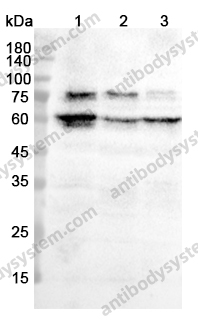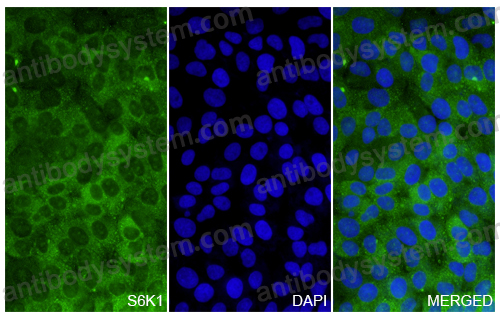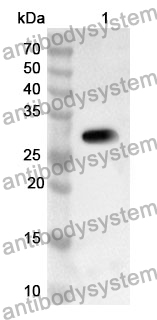Catalog No.
PHD57801
Species reactivity
Human, Mouse, Rat
Host species
Rabbit
Isotype
IgG
Clonality
Polyclonal
Immunogen
E. coli - derived recombinant Human S6K1/RPS6KB1 (Phe91-Phe352).
Tested applications
ELISA: 1:4000-1:8000, IHC: 1:50-1:100, WB: 1:1000-1:4000
Target
S6K-beta-1,70 kDa ribosomal protein S6 kinase 1,p70 S6KA,p70-S6K 1,S6K1,Serine/threonine-protein kinase 14A,p70 ribosomal S6 kinase alpha,p70 S6 kinase alpha,STK14A,RPS6KB1,Ribosomal protein S6 kinase I,p70 S6K-alpha,P70S6K1,Ribosomal protein S6 kinase beta-1
Purification
Purified by antigen affinity column.
Accession
P23443
Applications
ELISA, IHC, WB
Form
Liquid
Storage buffer
0.01M PBS, pH 7.4, 50% Glycerol, 0.05% Proclin 300.
Stability and Storage
Use a manual defrost freezer and avoid repeated freeze thaw cycles. Store at 2 to 8°C for frequent use. Store at -20 to -80°C for twelve months from the date of receipt.
Enhanced Antipediatric Sarcoma Effect of Everolimus with Secukinumab by Targeting IL17A., PMID:38295302
Notch signaling regulates Th17 cells differentiation through PI3K/AKT/mTORC1 pathway and involves in the thyroid injury of autoimmune thyroiditis., PMID:38285310
Loss of LCMT1 and biased protein phosphatase 2A heterotrimerization drive prostate cancer progression and therapy resistance., PMID:37644036
Assessment of PI3K/mTOR/AKT Pathway Elements to Serve as Biomarkers and Therapeutic Targets in Penile Cancer., PMID:34066040
Inhibition of p70 isoforms of S6K1 induces anoikis to prevent transformed human hepatocyte growth., PMID:33189822
Enhancing KDM5A and TLR activity improves the response to immune checkpoint blockade., PMID:32908002
Identification of MALT1 feedback mechanisms enables rational design of potent antilymphoma regimens for ABC-DLBCL., PMID:32785655
Immunofluorescence can assess the efficacy of mTOR pathway therapeutic agent Everolimus in breast cancer models., PMID:31358767
mTORC1 Signaling in Individual Human Muscle Fibers Following Resistance Exercise in Combination With Intake of Essential Amino Acids., PMID:31294029
Selenium deficiency impaired immune function of the immune organs in young grass carp (Ctenopharyngodon idella)., PMID:29559270
Dietary pyridoxine deficiency reduced growth performance and impaired intestinal immune function associated with TOR and NF-κB signalling of young grass carp (Ctenopharyngodon idella)., PMID:28951222
Threonine deficiency decreased intestinal immunity and aggravated inflammation associated with NF-κB and target of rapamycin signalling pathways in juvenile grass carp (Ctenopharyngodon idella) after infection with Aeromonas hydrophila., PMID:28820083
Synaptically driven phosphorylation of ribosomal protein S6 is differentially regulated at active synapses versus dendrites and cell bodies by MAPK and PI3K/mTOR signaling pathways., PMID:28716954
Reciprocal regulation of mTOR complexes in pancreatic islets from humans with type 2 diabetes., PMID:28004151
Trastuzumab stimulation of ribosomal protein S6 kinase 1 (S6K1) predicts de novo trastuzumab resistance., PMID:27993682
Mechanistic target of rapamycin complex 1 is involved in psoriasis and regulated by anti-TNF-α treatment., PMID:27943462
mTOR inhibition sensitizes ONC201-induced anti-colorectal cancer cell activity., PMID:27565731
17β-estradiol activates mTOR in chondrocytes by AKT-dependent and AKT-independent signaling pathways., PMID:26884863
Effect of caloric restriction on the SIRT1/mTOR signaling pathways in senile mice., PMID:26135885
Sensitization of HER2 Positive Breast Cancer Cells to Lapatinib Using Plants-Derived Isothiocyanates., PMID:26134366
Sirolimus and trastuzumab combination therapy for HER2-positive metastatic breast cancer after progression on prior trastuzumab therapy., PMID:25687356
A Phase I Study of Cixutumumab (IMC-A12) in Combination with Temsirolimus (CCI-779) in Children with Recurrent Solid Tumors: A Children's Oncology Group Phase I Consortium Report., PMID:25467181
Relation between outcomes and expression of estrogen receptor-α phosphorylated at Ser(167) in endometrioid endometrial cancer., PMID:25154549
Insulin activation of vacuolar protein sorting 34 mediates localized phosphatidylinositol 3-phosphate production at lamellipodia and activation of mTOR/S6K1., PMID:24582588
The immunosuppressant tributyltin oxide blocks the mTOR pathway, like rapamycin, albeit by a different mechanism., PMID:24375594
Elevated protein kinase D3 (PKD3) expression supports proliferation of triple-negative breast cancer cells and contributes to mTORC1-S6K1 pathway activation., PMID:24337579
Contribution of S6K1/MAPK signaling pathways in the response to oxidative stress: activation of RSK and MSK by hydrogen peroxide., PMID:24058693
Insulin activates RSK (p90 ribosomal S6 kinase) to trigger a new negative feedback loop that regulates insulin signaling for glucose metabolism., PMID:24036112
Increased lysosomal biogenesis in activated microglia and exacerbated neuronal damage after traumatic brain injury in progranulin-deficient mice., PMID:23830905
LAM cells biology and lymphangioleiomyomatosis., PMID:23690211
Development of monoclonal antibodies specific to ribosomal protein S6 kinase 2., PMID:22894784
Metformin: direct inhibition of rat ovarian theca-interstitial cell proliferation., PMID:22608319
The role of mTOR inhibitors in the inhibition of growth and cortisol secretion in human adrenocortical carcinoma cells., PMID:22420007
Proangiogenic effect of TSH in human microvascular endothelial cells through its membrane receptor., PMID:22419707
mTOR is required for asymmetric division through small GTPases in mouse oocytes., PMID:22407942
Understanding the mechanistic roles of 30Kc6 gene in apoptosis and specific productivity in antibody-producing Chinese hamster ovary cells., PMID:22367610
Inhibition of chemokine (CXC motif) ligand 12/chemokine (CXC motif) receptor 4 axis (CXCL12/CXCR4)-mediated cell migration by targeting mammalian target of rapamycin (mTOR) pathway in human gastric carcinoma cells., PMID:22337890
Evaluation of the nutrient-sensing mTOR pathway., PMID:22125058
mTOR kinase domain phosphorylation promotes mTORC1 signaling, cell growth, and cell cycle progression., PMID:21576368
ULK1 inhibits mTORC1 signaling, promotes multisite Raptor phosphorylation and hinders substrate binding., PMID:21460630
Insulin-induced serine phosphorylation of IRS-2 via ERK1/2 and mTOR: studies on the function of Ser675 and Ser907., PMID:21098738
Obestatin as a regulator of adipocyte metabolism and adipogenesis., PMID:21029370
Steady-state kinetic and inhibition studies of the mammalian target of rapamycin (mTOR) kinase domain and mTOR complexes., PMID:20804212
S6K1 is acetylated at lysine 516 in response to growth factor stimulation., PMID:20599721
Hepatitis C virus NS5A activates the mammalian target of rapamycin (mTOR) pathway, contributing to cell survival by disrupting the interaction between FK506-binding protein 38 (FKBP38) and mTOR., PMID:20439463
Metformin and cancer: doses, mechanisms and the dandelion and hormetic phenomena., PMID:20305377
Chronic inhibition of the mTORC1/S6K1 pathway increases insulin-induced PI3K activity but inhibits Akt2 and glucose transport stimulation in 3T3-L1 adipocytes., PMID:20203102
S6K1 deficiency protects against apoptosis in hepatocytes., PMID:19437488
Resistance exercise increases postprandial muscle protein synthesis in humans., PMID:19092695
Regulation and localization of ribosomal protein S6 kinase 1 isoforms., PMID:19085255



